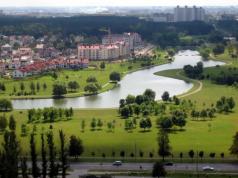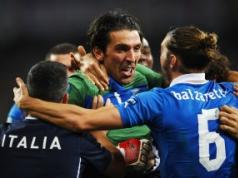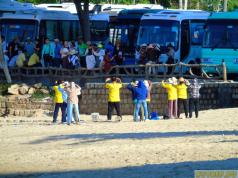-
Victoria Alaya 2 years ago
Do you applaud when landing?
(2 users)
Answer: Today I heard applause for the first time on a big flight and was very surprised: can pilots hear them? But I don’t understand people who compare an airplane with a subway or a minibus. Anyone could do the latter after a short course, and many already drive a car. How long does it take to study to become a pilot and how? Have you even seen the airplane dashboard in the picture? Or do you think all these light bulbs and toggle switches are there for beauty? And would you sit down and fly? Would you like to take a “course”? Wouldn't you be afraid? Sneeze once?! Personally, I feel how much our lives are in the skillful hands of the pilots during the flight and I also experience a surge of emotions at the moment of landing, but I ask the flight attendants to thank the pilots upon exiting. Still, there is something sacred in rising into the sky, and people feel it, whose soul has not yet died, to “philosophize” that this is bullshit and compare flying with a trip on the subway! Although clapping as a sign of gratitude is, of course, stupid when they don’t hear you. Vampire 2 years ago
Do you applaud when landing?
(2 users)
Answer: To applaud or not is everyone's personal choice. For example, I don’t applaud. Moreover, I don’t understand why the clapping starts the moment the landing gear touches the runway? After all, the speed is high enough for a possible incident, accident, etc. I could still understand if they were clapping when the plane stopped, but at that moment no one cared, and my applause would be completely inappropriate. All the best and a soft landing!Catherine 3 years ago
Only on charter flights can you hear this. Only Russia and Ukraine have fun like this. The rest behave as casually as in any other transport. Simply by buying a ticket, for example, on Turkish Airlines and starting to clap during takeoff, they will look at you like you are an idiot. To be honest, such herd senseless applause irritates me terribly.
(7 users)alltrueman 3 years ago
Do you applaud when landing?
Answer: But I was wondering if they would clap during a really difficult landing: during an emergency descent, depressurization, or a throw during wind shear? It’s unlikely that there will be time for that, many people will have wet pants... So all this is nothing more than a tribute to stupid fashion, which, by the way, appeared quite recently.
Donskaya 1 year ago
Answer: Yes, if this landing is soft and professional. This is an artistic tradition of people who fly very often to different cities and countries. When they ask why we don’t give applause to minibus or metro drivers, then going further, you can ask the question: why applaud a circus performer flying under the circus dome? After all, this is his job! Let him tumble without applause! I admire what an artist, a pilot, an astronaut, a surgeon does! Applause is heard for the teacher after an interesting lecture, in choreography halls, in acting classes at the end of classes! This is a sincere thank you for a job well done! And it is right! I will thank the people who took responsibility for my life for some time in the future!
There is a widespread stereotype that applause upon landing is an exclusively “Soviet” tradition. In fact, this is not so; the roots of this phenomenon must be sought in Europe.
Russians began clapping en masse only after the 90s, when people began to travel abroad and saw how they did it there.
And in Soviet times, passengers sometimes clapped, but only when landing took place in some difficult weather conditions or when the flight was associated with some difficulties.
Italians still often greet soft landings with applause. True, most Europeans have already “got over it” and applaud only after landing in difficult conditions.
The most interesting thing is that the pilots do not hear people clapping in the cabin, they are separated by an armored door, but the flight attendants always report: the landing went well, the passengers were happy and applauded.
Those who have flown know that immediately after landing there is not a flurry of applause. There are always two or three people who start first, and other passengers already join them. Most likely this happens due to emotional stress associated with the fear of flying. People are stressed and need to release their emotions urgently. Doing something eccentric, for example, screaming, dancing and the like, does not seem to be comme il faut. And thanking the pilots and crew is just the thing.
This explanation is also supported by the observation that clapping occurs most often on charter flights. After all, charters are mostly used by those who fly once or twice a year on vacation and, accordingly, are especially nervous because they are not used to it.
You've probably also witnessed applause on a plane after a successful landing. This doesn’t always happen, but often everyone has been on a similar flight.
It is difficult to say where this tradition came from. Some say that it came from the West, and our people “clapped” en masse only after the 90s, when they began to travel abroad more often and saw how they do it there. Others argue that they began to applaud since Soviet times, when information about plane crashes and other incidents in the air ceased to be a state secret and became known to the masses.
On the one hand, passengers thus express joy and relief that the flight was completed successfully. On the other hand, applause serves as a kind of gratitude to the pilot for a successful and soft landing (if it really was soft). But what does the pilot himself think about this tradition? The channel talks about this Airplane pilot". The following is the text in the first person.
***
Let's figure out why you can't applaud after a plane lands.
Because most passengers do not know that the landing of an airplane does not end when the landing gear touches the runway, but only when the commander announces it.
Let me remind you of the incident in 2006 in Irkutsk, after landing, the plane was unable to brake and crashed into iron buildings. People immediately clapped after landing, but the flight did not end successfully.

Wait until they announce that boarding is complete. Then applaud, but I must disappoint you. We you we won't hear, because the doors are armored and practically nothing is heard between the cabin and the cockpit.
All the enthusiastic claps are heard only by the flight attendants and you! So if you want to thank the pilots for the flight, do one simple thing - be buckled up until the plane stops. For us, your safety is the best gratitude.
At the request of a reader, The Village decided to find out why Russian passengers clap for pilots after a plane lands and when this tradition began. For an answer, we turned to a pilot with extensive experience and a psychologist who works with aerophobes. The answer was quite unexpected.
Why are Russian passengers
do they pop when landing?
Oleg Smirnov
pilot with 40 years of experience
In reality, everything is not what you think. The habit of clapping after landing is not unique to Russians; on the contrary, this tradition came to us from the West. They began to clap for us en masse only after the 90s, when people began to travel abroad and saw how they do it there.
And in Soviet times, passengers sometimes clapped, but only when landing took place in some difficult weather conditions or when the flight was associated with some difficulties. Then - yes, it happened.
I’ll tell you a secret: the pilots don’t hear you clapping in the cabin, they are separated from you by an armored door, but the flight attendants always report: the landing went well, the passengers were happy and applauded. Of course, we are pleased with this, like any person who has done his job well and who has been appreciated.
Tatyana Volkova
psychologist working
with aerophobes
There is no single version of where the tradition of clapping your hands after landing came from. The most plausible one can be considered the following: this tradition became especially popular in the 90s, when information about plane crashes and other incidents in the air ceased to be a state secret and came out to the masses. Of course, the people were impressed and... rejoiced.
Clapping after boarding is almost the same as saying “thank you, it was very tasty” after dinner at a restaurant. Pilots, as well as cooks, will not hear this and can only learn about the reaction of grateful passengers from the flight attendants. Accordingly, when we clap, we do it not so much for them as for ourselves.
You may notice that immediately after landing there is not a flurry of applause. There are always two or three soloists who start first, and other passengers already join them. I would venture to guess that these soloists are more or less afraid of flying and their stress reaches its peak when landing. People are stressed and need to release their emotions urgently. Doing something eccentric, such as screaming, dancing, and the like, doesn’t seem comme il faut. And thanking the pilots and crew is just the thing. This explanation is also supported by the observation that clapping occurs most often on charter flights. After all, charters are mostly used by those who fly once or twice a year on vacation and, accordingly, are especially nervous because they are not used to it.
The custom of applauding a pilot during a soft landing was not invented by the Russians, but by the temperamental Italians. It was they who became the founders of the tradition of showing delight when meeting the earth. In our country there has never been such a manner of gratitude to the staff of pilots, even during the times of the USSR. They adopted it just recently, when they began to fly abroad en masse. Therefore, the myth that the Russians came up with a similar method of responding to a safe landing should be dispelled.
Why do people clap when landing?
Psychologists at Lancaster University studied this phenomenon and came to the conclusion that many people experience panic on board. Some even suffer from aerophobia, but find out about it already in the air. The moment the chassis touches the ground, a welcome relief sets in. However, the landing cannot yet be considered complete. There have been many cases when planes experienced technical problems precisely at the moment of landing. And not only in our country, but also abroad. Pilots are most tense at this moment because they are performing a serious maneuver. That’s why the applause comes ahead of time.
Some scientists believe that applause is often used as a sign of solidarity. When one person starts clapping, others join in the euphoria, thus supporting their neighbor. Many people even think that this is the custom, so they don’t want to stand out from the crowd, demonstrating their “lack of culture.”
What do pilots think about this custom?

Passengers may think that the pilots of the aircraft are pleased to hear a burst of applause in their honor. However, it is not. They do not care. Of course, every helmsman feels enormous responsibility for the lives of the people on board the aircraft. But they have their own rules and customs. It turns out that pilots are superstitious people. They can breathe a sigh of relief not when they land, but when the plane has completely stopped and the passengers are going down the ramp. Some pilots were interviewed and asked about applause. Everyone answered unanimously - they don’t care what passenger 20B thinks about their work.
Perhaps this will be a revelation for some, but the pilots don’t even hear the passengers’ reactions. They are behind armored doors and sitting at the helm wearing headphones. Therefore, they can only learn about the explosion of applause from the flight attendants. Essentially, passengers clap for themselves and thank each other. Well, there is nothing wrong with expressing gratitude to your neighbor for causing minimal inconvenience and also being pleasant company during a long flight, for example.
Who most often expresses gratitude with applause?
According to surveys conducted among pilots of both charter and domestic flights, people flying on vacation tend to express gratitude in the form of applause. If there are respectable businessmen in the salon who are heading to important meetings or negotiations, they are not inclined to express their admiration in this way. They probably understand that the staff is simply doing its job. Even if it’s very professional.
How else can you thank the crew?

Even if the pilots could hear the applause, they would not be happy about it. Agree, few professionals like it when someone doubts their competence. This is exactly the opinion expressed by all pilots in the world. They recommend that passengers refrain from applauding and, alternatively, leave feedback on the crew's overall performance. Gratitude can be expressed on the company website. However, more and more often we encounter just the opposite situation - passengers rarely leave written thanks. Increasingly, they find shortcomings in the work of the crew and do not forget to express their indignation in writing.
What do you think?







